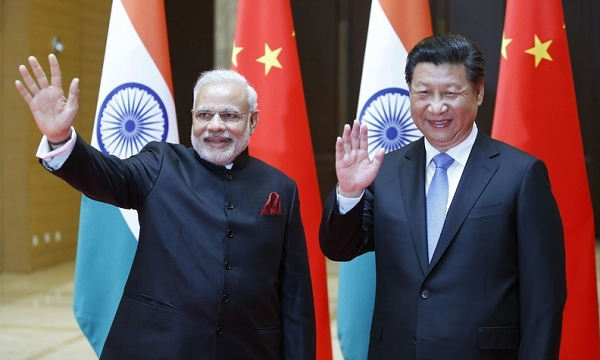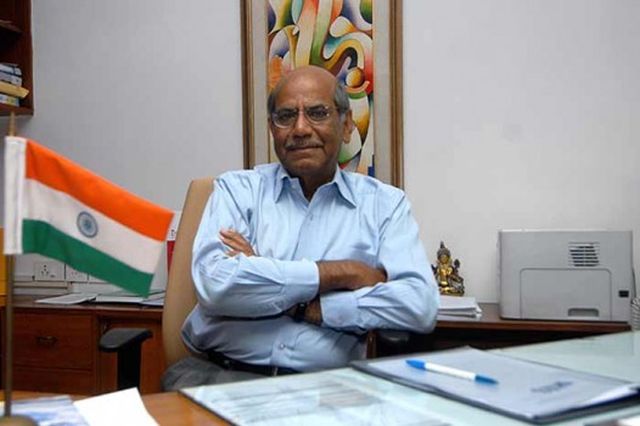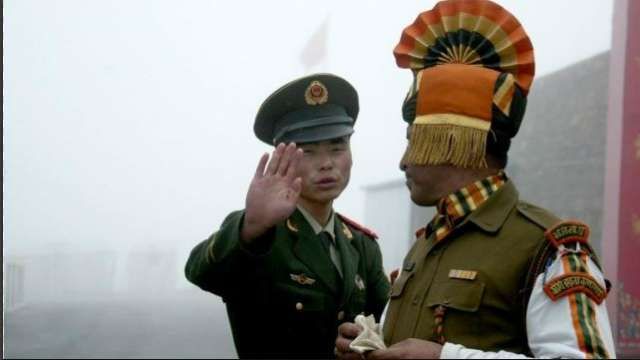
by Editor | May 25, 2021 | Business, Corporate, Corporate finance, Economy, Large Enterprise, News, Politics
 By Gaurav Sharma,
By Gaurav Sharma,
Beijing : China on Thursday said India will gain more if it joins the Belt and Road initiative at an early date.
Inviting India to be a part of China’s ambitious multi-trillion dollar project, the Foreign Ministry said New Delhi will get tangible benefits if it joins the initiative.
“We welcome other countries including India to participate in the Belt and Road initiative. The Belt and Road will bring tangible benefits to you if participated in at an early date,” Chinese Foreign Ministry spokesperson Geng Shuang said.
He was responding to reported remarks by a Chinese official that Beijing will try to address New Delhi’s concern over the Belt and Road project whose key artery goes through the disputed Kashmir.
Geng said he was not aware of any such statement.
India greatly opposes the project because the China-Pakistan Economic Corridor cuts through a part of Kashmir held by Islamabad and claimed by New Delhi.
However, China maintains that the project will not affect its neutrality over the Kashmir issue.
“As far as India is concerned, the goal of this initiative is to promote the connectivity between counties and promote common prosperity of all countries and the initiative will not affect China’s position on the relevant issue,” Geng said.
—IANS

by Editor | May 25, 2021 | Corporate
 By Gaurav Sharma,
By Gaurav Sharma,
Dalian (China) : Several Indian and Chinese IT companies on Wednesday got together in China’s port city of Dalian for cooperation in the field of artificial intelligence.
On the first India-China Dalian IoT (Internet of Things) Conference, the government officials and company representatives from both sides agreed that a lot can be done if India’s excellence in software technology and China’s expertise in hardware are brought together.
The event is being attended by 30 delegates representing the Indian government and companies, while 50 delegates from the Chinese industry are participating in the event.
Representatives of Indian companies like Wipro, HCL, Infosys, Cognizant and CBSI Technologies were present.
“Chinese hardware needs to be given soul that can come from India’s software technology,” said Sudhanshu Pandey, Joint Secretary, Department of Commerce (India).
Talking about the event, Dalian Municipal Government Mayor Xiao Shengfeng said: “India leads the world in software with a great foundation of IT and BPO services.”
“We believe that the conference co-organised by the two sides (NASSCOM and Dalian), serving as a platform for the upgrading of industries of Dalian, will drive the integration of advanced IT industry of India and the strong manufacturing industry of Dalian.
“We hope that the two sides will take good advantage of this conference to strengthen communication, increase understanding, and promote cooperation between IoT and smarter products that are in demand around the world,” Xiao said.
Gagan Sabharwal, Senior Director, Global Trade Development, NASSCOM said: “India and China have both leveraged our human capital to become the world leaders in our domains, and are heralded as the fastest growing economies.
“With the new Digital wave, today we have a unique opportunity to merge hardware and software together to create smart solutions for the world,” he said.
(Gaurav Sharma is the IANS correspondent in Beijing. He can be reached at sharmagaurav71@gmail.com)
—IANS

by Editor | May 25, 2021 | Interviews

Shyam Saran
By Saket Suman,
New Delhi : The areas of convergence between India and China are diminishing while those of confrontation have become “more salient”, former Foreign Secretary Shyam Saran says, adding that New Delhi had “judiciously” handled the two-month standoff on the Doklam plateau.
He also says that India and Pakistan had almost come to an agreement on demilitarising the Siachen glacier and mentions a “missed opportunity” to solve the Sir Creek dispute in Kutch.
“There are areas where India and China have convergent interests, but at the same time there are very divergent interests that are continuing as disputes between the two countries because of the unresolved border disputes. Essentially, over the last several years we have followed a strategy of building upon the areas of convergence with China but at the same time confronting China whenever our interests are threatened.
“If we compare the Indo-China relationship from the time I was the Foreign Secretary (2004-06) and what we see today, the big difference that appears, at least from the Chinese perspective, is that the areas of convergence have diminished in their importance while, inevitably, the areas of confrontation have become more salient,” the 71-year old career diplomat told IANS in an interview around his new book “How India Sees The World” (Juggernaut/Rs 599/320 Pages).
Elaborating further on this shift in Beijing’s foreign policy, Saran said that China now believes its GDP is five times the size of India and thus it has the dominant position and power in Asia. “It also has a sense that other countries in the region should accept its dominance and when there is a resistance to that, it leads to a rather negative reaction from China,” he said, adding that, according to him, the Doklam standoff is “a symptom of that changed attitude” between the two countries.
“In handling the Doklam crisis, India has shown both a certain level of prudence, (and) at the same time a level of firmness. I think it has been a good and judicious combination of being very calm and mature in our reactions to very harsh rhetoric from China, but at the same time maintaining a very firm position that the two sides need to go back to the status quo and China, having disturbed the status quo, has the responsibility to not escalate it further,” noted Saran, who has served as India’s ambassador to Myanmar, Indonesia and Nepal and as High Commissioner to Mauritius and also being a Prime Minister’s Special Envoy after retirement.
Saran maintained that despite border disputes between the two countries, it is possible to manage the situation at the frontier without letting it spill over into a clash of arms. And, he added, as long as New Delhi and Beijing maintain a very high level of engagement, their relations will remain on an even keel.
Responding to a question on the future of Sino-Indian ties, he said: “The management of this responsibility is not only the unilateral responsibility of India, we also need to look at the Chinese perspective and try to bring the perspective of the two countries closer to one another, or more aligned to one another. This can only be possible through dialogue.”
Asked whether New Delhi needs to take the growing relationship of China with Russia more seriously, Saran said that the entire international situation is undergoing a transition and so we cannot expect that any alignment or relationship will continue unaltered for a prolonged period.
“This is a reality we have to accept; but at the same time, in the long term, there continues to be a strong convergence of interest between India and Russia. So even if we take into account the China factor, because most of the anxiety in India is about how close Russia and China have become, my own sense is that going further, especially in the long term, China’s interests and Russia’s interests are not quite aligned. Any expansion of Chinese presence in Central Asia or Eastern Europe, as we see happening, will not be accepted by Russia.
“These are two areas which are of great importance to Russia and, therefore, whatever China may try to do to reduce the anxiety with Russia, I think it is inevitable that China and Russia will not find a commonality of interest, particularly in areas which are of importance to China. We should not react too negatively to the growing Russia-China ties, knowing full well that in the longer term, India’s and Russia’s interests are likely to be much closer together than would be the case with China,” he contended.
The most startling revelation that Saran makes in “How India Sees The World” is that India and Pakistan had almost come to an agreement on demilitarising the Siachen Glacier. According to the book, the draft agreement had been approved by all stakeholders. But the then Army Chief General J.J. Singh and then NSA M.K. Narayanan put forward last-minute reservations, which led to the cancellation of the proposal. The event had unfolded ahead of the India-Pakistan Defence Secretary-level talks in May 2006.
His book also talks about a “missed opportunity” to resolve the Sir Creek issue. “The Indian Navy had come up with a very innovative approach which would have determined the maritime boundary from a point out in the sea on the edge of the countries’ respective continental shelves, with equal lines drawn to points on each coast. This would have left a triangular zone of about a hundred square kilometres just at the mouth of the Sir Creek without a demarcation,” he writes in the book.
There was keen interest in Pakistan to follow this approach, Saran maintains, but India was unable to explore this further when the Siachen deal fell through.
After completing his tenure as Foreign Secretary, Saran was appointed the Prime Minister’s Special Envoy for the India-US civil nuclear deal and later as Special Envoy and Chief Negotiator on Climate Change.
(Saket Suman can be contacted at saket.s@ians.in)
—IANS

by Editor | May 25, 2021 | News, Politics
 New Delhi : India and China have agreed to “disengage” in Doklam area in Sikkim sector where the armies of both countries have been on a standoff since the middle of June, sharply escalating tensions.
New Delhi : India and China have agreed to “disengage” in Doklam area in Sikkim sector where the armies of both countries have been on a standoff since the middle of June, sharply escalating tensions.
The Ministry of External Affairs in a statement said that during bilateral communications, “we were able to express our views and convey our concerns and interests”.
“On this basis, expeditious disengagement of border personnel at face-off site at Doklam has been agreed to, and is ongoing.”
The decision to disengage their troops comes ahead of a crucial BRICS summit being hosted by China in September, which Prime Minister Narendra Modi is expected to attend.
—IANS




